#hierarchy
Text

one-sided monogamy (aka natural monogamy or traditional monogamy)
you are His property. He strictly forbids you from having intimate contact with anyone other than Him. your sexuality is entirely focused on His pleasure and satisfaction.
He is the Man, and as such He has the natural right to fuck whoever He chooses, without restrictions
20 notes
·
View notes
Text
tools not rules: the importance of critical thinking
More than once, I’ve talked about the negative implications of Evangelical/purity culture logic being uncritically replicated in fandom spaces and left-wing discourse, and have also referenced specific examples of logical overlap this produces re, in particular, the policing of sexuality. What I don’t think I’ve done before is explain how this happens: how even a well-intentioned person who’s trying to unlearn the toxic systems they grew up with can end up replicating those systems. Even if you didn’t grow up specifically in an Evangelical/purity context, if your home, school, work and/or other social environments have never encouraged or taught you to think critically, then it’s easy to fall into similar traps - so here, hopefully, is a quick explainer on how that works, and (hopefully) how to avoid it in the future.
Put simply: within Evangelism, purity culture and other strict, hierarchical social contexts, an enormous value is placed on rules, and specifically hard rules. There might be a little wiggle-room in some instances, but overwhelmingly, the rules are fixed: once you get taught that something is bad, you’re expected never to question it. Understanding the rules is secondary to obeying them, and oftentimes, asking for a more thorough explanation - no matter how innocently, even if all you’re trying to do is learn - is framed as challenging those rules, and therefore cast as disobedience. And where obedience is a virtue, disobedience is a sin. If someone breaks the rules, it doesn’t matter why they did it, only that they did. Their explanations or justifications don’t matter, and nor does the context: a rule is a rule, and rulebreakers are Bad.
In this kind of environment, therefore, you absorb three main lessons: one, to obey a rule from the moment you learn it; two, that it’s more important to follow the rules than to understand them; and three, that enforcing the rules means castigating anyone who breaks them. And these lessons go deep: they’re hard to unlearn, especially when you grow up with them through your formative years, because the consequences of breaking them - or even being seen to break them - can be socially catastrophic.
But outside these sorts of strict environments - and, honestly, even within them - that much rigidity isn’t healthy. Life is frequently far more complex and nuanced than hard rules really allow for, particularly when it comes to human psychology and behaviour - and this is where critical thinking comes in. Critical thinking allows us to evaluate the world around us on an ongoing basis: to weigh the merits of different positions; to challenge established rules if we feel they no longer serve us; to decide which new ones to institute in their place; to acknowledge that sometimes, there are no easy answers; to show the working behind our positions, and to assess the logic with which other arguments are presented to us. Critical thinking is how we graduate from a simplistic, black-and-white view of morality to a more nuanced perception of the world - but this is a very hard lesson to learn if, instead of critical thinking, we’re taught instead to put our faith in rules alone.
So: what does it actually look like, when rule-based logic is applied in left-wing spaces? I’ll give you an example:
Sally is new to both social justice and fandom. She grew up in a household that punished her for asking questions, and where she was expected to unquestioningly follow specific hard rules. Now, though, Sally has started to learn a bit more about the world outside her immediate bubble, and is realising not only that the rules she grew up with were toxic, but that she’s absorbed a lot of biases she doesn’t want to have. Sally is keen to improve herself. She wants to be a good person! So Sally joins some internet communities and starts to read up on things. Sally is well-intentioned, but she’s also never learned how to evaluate information before, and she’s certainly never had to consider that two contrasting opinions could be equally valid - how could she have, when she wasn’t allowed to ask questions, and when she was always told there was a singular Right Answer to everything? Her whole framework for learning is to Look For The Rules And Follow Them, and now that she’s learned the old rules were Bad, that means she has to figure out what the Good Rules are.
Sally isn’t aware she’s thinking of it in these terms, but subconsciously, this is how she’s learned to think. So when Sally reads a post explaining how sex work and pornography are inherently misogynistic and demeaning to women, Sally doesn’t consider this as one side of an ongoing argument, but uncritically absorbs this information as a new Rule. She reads about how it’s always bad and appropriative for someone from one culture to wear clothes from another culture, and even though she’s not quite sure of all the ways in which it applies, this becomes a Rule, too. Whatever argument she encounters first that seems reasonable becomes a Rule, and once she has the Rules, there’s no need to challenge them or research them or flesh out her understanding, because that’s never been how Rules work - and because she’s grown up in a context where the foremost way to show that you’re aware of and obeying the Rules is to shame people for breaking them, even though she’s not well-versed in these subjects, Sally begins to weigh in on debates by harshly disagreeing with anyone who offers up counter-opinions. Sometimes her disagreements are couched in borrowed terms, parroting back the logic of the Rules she’s learned, but other times, they’re simply ad hominem attacks, because at home, breaking a Rule makes you a bad person, and as such, Sally has never learned to differentiate between attacking the idea and attacking the person.
And of course, because Sally doesn’t understand the Rules in-depth, it’s harder to explain them to or debate with rulebreakers who’ve come armed with arguments she hasn’t heard before, which makes it easier and less frustrating to just insult them and point out that they ARE rulebreakers - especially if she doesn’t want to admit her confusion or the limitations of her knowledge. Most crucially of all, Sally doesn’t have a viable framework for admitting to fault or ignorance beyond a total groveling apology that doubles as a concession to having been Morally Bad, because that’s what it’s always meant to her to admit you broke a Rule. She has no template for saying, “huh, I hadn’t considered that,” or “I don’t know enough to contribute here,” or even “I was wrong; thanks for explaining!”
So instead, when challenged, Sally remains defensive: she feels guilty about the prospect of being Bad, because she absolutely doesn’t want to be a Bad Person, but she also doesn’t know how to conceptualise goodness outside of obedience. It makes her nervous and unsettled to think that strangers could think of her as a Bad Person when she’s following the Rules, and so she becomes even more aggressive when challenged to compensate, clinging all the more tightly to anyone who agrees with her, yet inevitably ending up hurt when it turns out this person or that who she thought agreed on What The Rules Were suddenly develops a different opinion, or asks a question, or does something else unsettling.
Pushed to this sort of breaking point, some people in Sally’s position go back to the fundamentalism they were raised with, not because they still agree with it, but because the lack of uniform agreement about What The Rules Are makes them feel constantly anxious and attacked, and at least before, they knew how to behave to ensure that everyone around them knew they were Good. Others turn to increasingly niche communities and social groups, constantly on paranoid alert for Deviance From The Rules. But other people eventually have the freeing realisation that the fixation on Rules and Goodness is what’s hurting them, not strangers with different opinions, and they steadily start to do what they wanted to do all along: become happier, kinder and better-informed people who can admit to human failings - including their own - without melting down about it.
THIS is what we mean when we talk about puritan logic being present in fandom and left-wing spaces: the refusal to engage with critical thinking while sticking doggedly to a single, fixed interpretation of How To Be Good. It’s not always about sexuality; it’s just that sexuality, and especially queerness, are topics we’re used to seeing conservatives talk about a certain way, and when those same rhetorical tricks show up in our fandom spaces, we know why they look familiar.
So: how do you break out of rule-based thinking? By being aware of it as a behavioural pattern. By making a conscious effort to accept that differing perspectives can sometimes have equal value, or that, even if a given argument isn’t completely sound, it might still contain a nugget of truth. By trying to be less reactive and more reflective when encountering positions different to your own. By accepting that not every argument is automatically tied to or indicative of a higher moral position: sometimes, we’re just talking about stuff! By remembering that you’re allowed to change your position, or challenge someone else’s, or ask for clarification. By understanding that having a moral code and personal principles isn’t at odds with asking questions, and that it’s possible - even desirable - to update your beliefs when you come to learn more than you did before.
This can be a scary and disquieting process to engage in, and it’s important to be aware of that, because one of the main appeals of rule-based thinking - if not the key appeal - is the comfort of moral certainty it engenders. If the rules are simple and clear, and following them is what makes you a good person, then it’s easy to know if you’re doing the right thing according to that system. It’s much, much harder and frequently more uncomfortable to be uncertain about things: to doubt, not only yourself, but the way you’ve been taught to think. And especially online, where we encounter so many more opinions and people than we might elsewhere, and where we can get dogpiled on by strangers or go viral without meaning to despite our best intentions? The prospect of being deemed Bad is genuinely terrifying. Of course we want to follow the Rules. But that’s the point of critical thinking: to try and understand that rules exist in the first place, not to be immutable and unchanging, but as tools to help us be better - and if a tool becomes defunct or broken, it only makes sense to repair it.
Rigid thinking teaches us to view the world through the lens of rules: to obey first and understand later. Critical thinking teaches us to use ideas, questions, contexts and other bits of information as analytic tools: to put understanding ahead of obedience. So if you want to break out of puritan thinking, whenever you encounter a new piece of information, ask yourself: are you absorbing it as a rule, or as a tool?
10K notes
·
View notes
Text
Can we please stop putting down autistic, ADHD, and other neurodivergent people whose traits are considered 'cringe', 'dorky', 'weird' or something else considered to be socially unacceptable?
We get enough shit from neurotypical people—we don't need to throw each other under the bus too.
"But they're making us look bad!"
I. Don't. Care. It's wrong to put each other on hierarchies. Simple.
#neurodivergence#neurodivergent#ableism#autism#autistic#actually autistic#adhd#actuallyautistic#audhd#aspie supremacy#pick me behavior#internalized ableism#hierarchy#hierarchies#actually audhd#actually neurodivergent#neurodiversity#vent post#rant post
614 notes
·
View notes
Text

Come, fag! Crawl over here, between my legs. Smell the masculinity of my balls. Take this superior scent deep in. It shows your place in the hierarchy. Arab Kings on top and fags below, the lowest of all. Born to submit. Take my Cock out, filthy slut. And do your job. Empty my balls. Swallow my strong seed and thank me for that, stupid whore!
#arab master#arab superiority#muslim supremacy#mnwo#muslim superiority#maître rebeu#rebeu#rebeu gay#rebeux#on your knees#arab supremacy#arabe#saudi arabia#arabmen#sexy arab#arab men#arabic#muslim#eurabia#refugees welcome#middleeasternmen#middle east#alpha master#alpha man#alpha jock#maghreb#hierarchy#morocco#moroccan#algerian
308 notes
·
View notes
Text
What to read after Light Bringer? (Series similar to Red Rising)
August 2023 update!
Red Rising is my favorite series of all time, and since I first read it, I have sought series and books similar in both spirit and execution. Some of these recs are books I haven’t read personally, but have often come up in discussions with other users!
1. The Stormlight Archive by Brandon Sanderson

Status: ongoing, expected 10 books in total, 4/10 out at the moment
Book 1: The Way of Kings. The Way of Kings takes place on the world of Roshar, where war is constantly being waged on the Shattered Plains, and the Highprinces of Alethkar fight to avenge a king that died many moons ago.
2. The Craft Sequence by Max Gladstone

Status: finished, 6/6 books out.
Book 1 (in publication order): Three Parts Dead. Comprised of 6 standalone books set in the same universe, the Craft Sequence tells the tales of the city of Alt Coulumb. The city came out of the God Wars with one of its gods intact, Kos the Everburning. In return for the worship of his people, Kos provides heat and steam power to the citizens of Alt Coulumb; he is also the hub of a vast network of power relationships with other gods and god-like beings across the planet. Oh, and he has just died. If he isn’t revived in some form by the turn of the new moon, the city will descend into chaos and the finances of the globe will take a severe hit.
3. Hierarchy by James Islington

Status: ongoing, 1/3 planned books out
Book 1: The Will of the many. The Will of the Many tells the story of Vis, a young orphan who is adopted by one of the sociopolitical elites of the Hierarchy. Vis is tasked with entering a prestigious magical academy with one goal – ascend the ranks, figure out what the other major branches of the government are doing, and report back. However, that isn’t quite as easy as Vis or anyone else thought it was going to be…
4. Suneater by Christopher Ruocchio
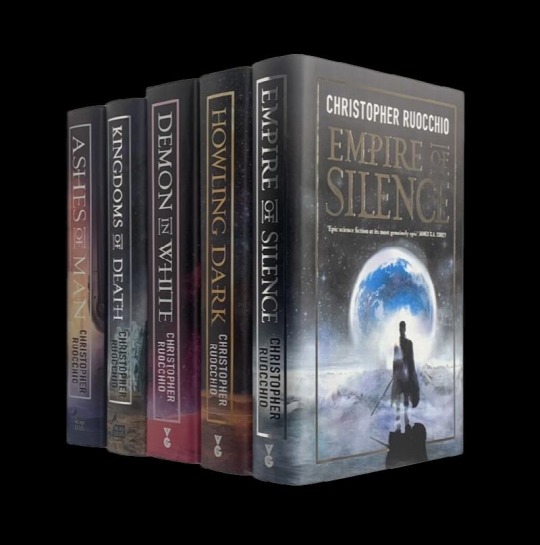
Status: ongoing, 5/7 books out
Book 1: Empire of Silence. Hadrian is a man doomed to universal infamy after ordering the destruction of a sun to commit an unforgivable act of genocide. Told as a chronicle written by an older Hadrian, Empire of Silence details his earlier adventures and serves as an introduction to the characters and the setting.
5. Dune by Frank Herbert

Status: completed, 6/6 books out
Book 1: Dune. Set in the distant future amidst a feudal interstellar society in which various noble houses control planetary fiefs. It tells the story of young Paul Atreides, whose family accepts the stewardship of the planet Arrakis. While the planet is an inhospitable and sparsely populated desert wasteland, it is the only source of melange, or "spice", a drug that extends life and enhances mental abilities.
6. The Expanse by James S A Corey
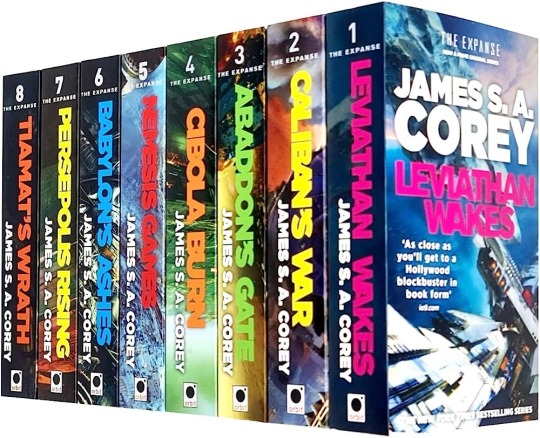
Status: completed, 9/9 books out
Book 1: Leviathan wakes. Set hundreds of years in the future, after mankind has colonized the solar system. A hardened detective and a rogue ship's captain come together for what starts as a missing young woman and evolves into a race across the solar system to expose the greatest conspiracy in human history.
7. The First Law by Joe Abercrombie

Status: completed. 3 books in the original trilogy + 3 standalone books + 3 books in the newest trilogy
Book 1: The Blade Itself. The story follows the fortunes and misfortunes of bad people who do the right thing, good people who do the wrong thing, stupid people who do the stupid thing and, well, pretty much any combination of the above. Survival is no mean feat, and at the end of the day, dumb luck might be more of an asset than any amount of planning, skill, or noble intention.
8. Cradle by Will Wight
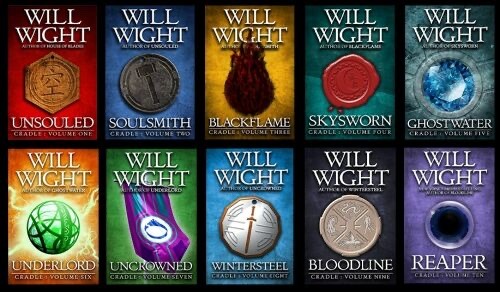
Status: completed, 12/12 books out
Book 1: Unsouled. Lindon is Unsouled, forbidden to learn the sacred arts of his clan. When faced with a looming fate he cannot ignore, he must rise beyond anything he's ever known...and forge his own Path
9. Hyperion Cantos by Dan Simmons (one PB’s favorites)

Status: completed, 4/4 books out
Book 1: Hyperion. The story weaves the interlocking tales of a diverse group of travelers sent on a pilgrimage to the Time Tombs on Hyperion. The travelers have been sent by the Church of the Final Atonement, alternately known as the Shrike Church, and the Hegemony (the government of the human star systems) to make a request of the Shrike. As they progress in their journey, each of the pilgrims tells their tale.
#red rising#golden son#morning star#pierce brown#dark age#iron gold#light bringer#what to read#book rec#book recommendation#books#stormlight archive#hyperion cantos#craft sequence#the expanse#hierarchy#the will of the many#first law#suneater#sun eater#dune#cradle series
472 notes
·
View notes
Text

Muslim and kafir
88 notes
·
View notes
Text
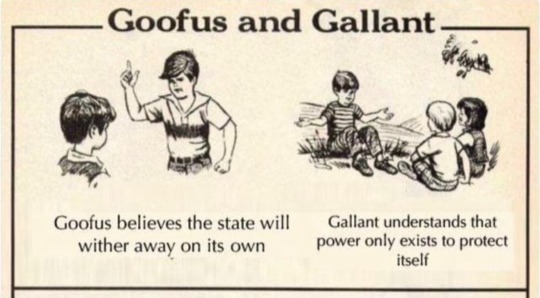
277 notes
·
View notes
Text

Reposting something from my old blog.
#faggotsforuse#faggot slave#beta faggot#alpha master#straight master#gayslave#hierarchy#male foot#malefeet#male findom#findom paypig#cashfag#cash master
97 notes
·
View notes
Text





♡ Fourth Wing/ Iron Flame - Character List, Hierarchy Chart, and Bond/Signet Chart ♡
I made these to help those needing some info/ help while reading or curious about details! It may not be 100% but it is as accurate as possible. I noted characters and bonds as I read and felt the need to note so not all characters are listed but most important or seemingly plot significant are!
mostly spoiler free for anyone to use!
#fourth wing#romantasy#iron flame#rebecca yarros#hierarchy#characters#the empyrean#signet#dragon bonds#books and reading
66 notes
·
View notes
Text
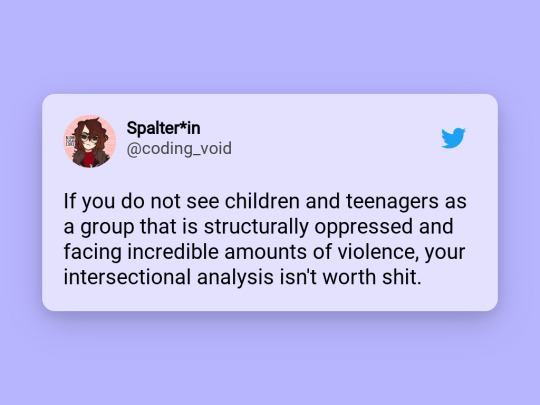
If you do not see children and teenagers as a group that is structurally oppressed and facing incredible amounts of violence, your intersectional analysis isn't worth shit.
source
369 notes
·
View notes
Text

What the fuck are you doing here, fag! Don’t ever come to me again when I am with my fiends. How dare you to even look me into the eyes in public. You stupid filthy whore! I will come to your place to kick you in your balls. After that you beg me for forgiveness. Beg me for my Arab Cock. And maybe I will rape your holes. Go, fucking slut!
#arab master#arab superiority#muslim supremacy#mnwo#muslim superiority#maître rebeu#rebeu#rebeu gay#rebeux#on your knees#arab supremacy#arabe#saudi arabia#arabmen#sexy arab#arab men#arabic#muslim#eurabia#maghreb#middleeasternmen#middle east#refugees welcome#refugees#alpha master#alpha man#alpha jock#hierarchy#morocco#moroccan
133 notes
·
View notes
Quote
The serf is in essence different from the knight, but a reference to divine right is necessary to legitimize this statutory defense.
Frantz Fanon, The Wretched of the Earth
#philosophy#quotes#Frantz Fanon#The Wretched of the Earth#equality#legitimacy#hierarchy#power#oppression#ethics
32 notes
·
View notes
Text
Celebrating 3,000 Followers*
"Right," said Om. "Now...listen. Do you know how gods get power?"
"By people believing in them," said Brutha. "Millions of people believe in you."
Om hesitated.
All right, all right. We are here and it is now. Sooner or later he'll find out for himself...
"They don't believe," said Om.
"But--"
"It's happened before," said the tortoise. "Dozens of times. D'you know Abraxas found the lost city of Ee? Very strange carvings, he says. Belief, he says. Belief shifts. People start out believing in the god and end up believing in the structure."
"I don't understand," said Brutha.
"Let me put it another way," said the tortoise. "I am your God, right?"
"Yes."
"And you'll obey me."
"Yes."
"Good. Now take a rock and go and kill Vorbis."
Brutha didn't move.
"I'm sure you heard me," said Om.
"But he'll...he's...the Quisition would--"
"Now you know what I mean," said the tortoise.
Terry Pratchett, Small Gods
*This post is in honor of you 3,011 people who like to see a Pratchett quote on your dash every day. Like a god of the Discworld, this blog only exists because people choose to follow it. Thanks to all of you who love to share this funny and poignant and chaotic world of Pratchett with strangers you will never meet. In the sharing, we are reminded of the things we believe and why they matter to us. You know what I mean.
#brutha#om#vorbis#small gods#discworld#terry pratchett#diety#gods#belief#atheism#power#religion#obedience#structure#hierarchy#fear#logic#logical fallacies#theology#life lessons#the lost city of ee#we are here and it is now#long quote#footnotes for followers
185 notes
·
View notes
Text

natural order
95 notes
·
View notes
